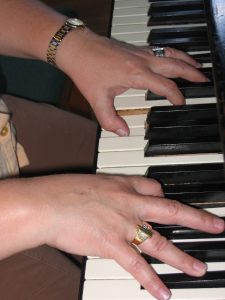 If you have read any of the posts on my personal blog, you will at once notice that I have written a number of posts on practice.
If you have read any of the posts on my personal blog, you will at once notice that I have written a number of posts on practice.
Spiritual practice, musical practice, ethical practice, best practice: practice, practice, practice! It certainly seems obvious that a longtime musician is committed to practice, but there is a deeper historical and theological component to my fascination with practice.
As a child growing up in a small Presbyterian church in the Texas panhandle, and then in big Presbyterian churches in Midland and Houston, I don’t ever remember hearing the term spiritual practice. Through all those years, I was certainly practicing music all the time, and I knew that if you wanted to play Beethoven and Brahms you were going to have to practice, but I didn’t have a clue as to how to “practice” my faith. I think, like most people, that faith as I learned it, was a set of belief systems that helped you to get closer to God and then live your life well. If you got your beliefs in order, then a good and happy life would follow. The difference was subtle, but important as we did many of the practices I now value. We prayed, we sang, we served, but somehow I learned that practice followed belief and I failed to learn that good spiritual practice could actually lead to belief.
This “faith before practice” spiritual life fell apart when so many friends got sick and then died from HIV/AIDS. I couldn’t find a belief system that explained this repeating horror. My experience of those years made me question everything. Does God exist? And if so, and if God is good and if God is love, than why are my friends dying so horribly? And why would a loving and gracious God tolerate having followers who simply heaped invective upon invective upon those of us who were suffering? And worse yet, if God is not good and God is not love, but is indeed the vengeful, wrath-filled villian who has inflicted HIV/AIDS upon all these beautiful young people all over the world, well then, I don’t know what to believe at all.
Meanwhile, those of us who were infected and affected by HIV/AIDS loved one another through the pain. We encouraged each other to come out as gay or lesbian. We built an entire infrastructure of care outside of the normal health and social services circles. We developed practices for caregiving, treatment, safer sex, and for community. We developed practices for hope. We did what we could do and developed ethical practices on the fly. We developed practices for political engagement that drew upon the practices of non-violence, but added in dimensions of personal storytelling that drew from the “personal is political” commitments of the second wave of feminism.
We discovered over and over that practice works when faith fails.
You don’t have to believe in God to practice the love of God.
And if you practice the love of God, pretty soon you will begin to believe in God again.
When I came back into the church, (I was unable to bear the silence and homophobia of the “Church” during the worst of the “dying years”) weary with grief and in desperate need of peace, consolation, and rest in the midst of so much practice, I was not able to simply resume a spiritual life based upon belief alone. I needed spiritual/faith practices that would sustain me. I needed spiritual practices that would lead me closer to God. For throughout all my struggles with faith and death, I could not shake the presence of God. In fact, my trust in the existence of God had been greatly strengthened by the experience of so much dying. I felt a deep kinship with the suffering of Jesus and the power of transcendent love to heal. The gentle Jesus “meek and mild” of my early childhood faded away when I began to identify with those outcasts and lepers whom Jesus loved so fiercely. For me, practice without belief finally led me home to faith that cannot be separated from practice.
Now what I find is that lots of folks are looking to preach their practice. This is a counter-cultural move to fundamentalist faiths that continue to insist that right belief is more important than right practice. An emphasis on spiritual practice is also helpful in allowing folks with deeply divergent theological and philosophical points of view to work well together in community. Finding a set of common practices for service is essential in interfaith efforts and ecumenical cooperation.
What are your own spiritual practices? Do they lead you to greater faith? Do you find peace and comfort as a result of your spiritual practice? If there are “holes” in your faith, could you imagine practices that might help you?
